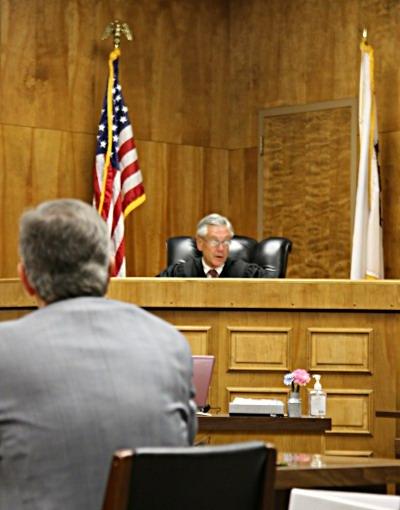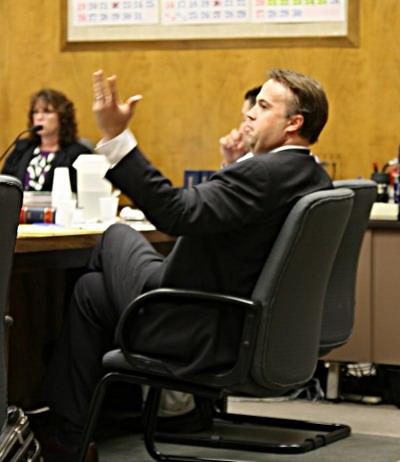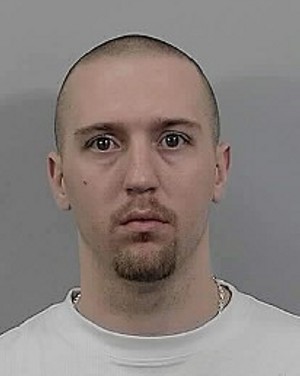
Judge J. Michael Byrne discusses the motions in the Bismarck Dinius case as District Attorney Jon Hopkins looks on in Lake County Superior Court on Tuesday, July 21, 2009. Photo by Harold LaBonte.
THIS STORY HAS BEEN UPDATED.
LAKEPORT – On Tuesday District Attorney Jon Hopkins went forward with dropping a vehicular manslaughter charge against a Carmichael man, while the defense filed a motion arguing for prosecutorial misconduct due to an open letter Hopkins issued Friday.
Judge J. Michael Byrne ruled that he found no misconduct on Hopkins' part, although he told the district attorney he didn't think issuing the open letter at this time was a good idea.
The day also saw a jury impaneled for Bismarck Dinius' trial, set to start next week.
Hopkins moved to drop the manslaughter charge against the 41-year-old Dinius, who is being tried for an April 29, 2006, boating collision that mortally injured Willows resident Lynn Thornton.
Dinius was steering a sailboat owned by Thornton's boyfriend, Mark Weber of Willows, when it was hit by a power boat driven by Russell Perdock, an off-duty chief deputy with the Lake County Sheriff's Office. Thornton died a few days later. Perdock was not charged in the case.
In an open letter to the community issued last Friday, Hopkins announced his plans to drop the felony vehicular manslaughter with a boat charge against Dinius, but noted his intention to move forward with a felony charge of boating under the influence causing great bodily injury.
Victor Haltom, Dinius' attorney, argued that the two charges are basically the same, and rotate on the same factual issues, so dropping the manslaughter charge was meaningless.
He also filed a motion alleging prosecutorial misconduct on Hopkins' part for releasing the letter in the middle of jury selection.
Hopkins said he chose to release the open letter at a time when it would not influence the jury. “This publicity is the result of information after the entire jury panel has been admonished by the court not to follow any media, including Internet and so forth,” he said.
If there's a question of jurors having seen the information, he suggested it would be a good idea to question them during the remainder of the selection process.
He said counsel can issue statements to mitigate “recent adverse publicity” that might affect a client in a case such as this.
“My client, of course, is the people, the community,” he said.
Hopkins said there has been a “steady barrage” of media coverage on the case that goes back a long time. He faulted Haltom for allegedly submitting all of his filings and motions to the media, saying that Haltom's entire 51-page prosecutorial misconduct motion was on a Bay Area TV Web site.
“We have had a blatant publicity campaign for months and months and months,” Hopkins said.
As a result, Hopkins said jurors have come to believe information that he characterized as false in the case.
He said Haltom has engaged in person attacks on him. “That is not the tenor of what I released.”
Hopkins also asserted that he didn't release any information that argued Dinius is guilty.
Haltom, Hopkins asserted, released false and misleading information to inflame jurors, while Hopkins argued that his open letter “is designed to not affect the jury.”
In addition, Hopkins said he wanted Judge Byrne to rule on whether or not there was any legal authority requiring the DUI charge to be dismissed along with the manslaughter charge.
During his arguments, Haltom said Hopkins' Friday afternoon letter “is a remarkable, unprecedented event.”
“I've never seen anything like it,” said Haltom. “The whole thing is an argument that Mr. Dinius is guilty.”
Haltom said Hopkins' letter repeatedly accused Dinius of being a “drunken sailor.” The fact that he also included information about Dinius' previous driving under the influence conviction was “egregious” and wouldn't be admissable in court.
Byrne asked where the statement actually had ended up. Haltom said it was posted on the district attorney's Web site and published in local media.
Haltom said the press has been interested in the case throughout the proceedings, and he maintained he has spoken to the press in an ethical manner at all times. Any information he's released has been public record.
The timing of the letter will result in the issue being talked about, and will “slow things down” as they have to question jurors more closely, Haltom said.
Arguing for the dismissal of the DUI charge, Haltom said there are for elements to consider for both offenses – driving, being under the influence, commission of a negligent act or omission and proximate causation of death.
“In this case those two charges are the same,” he said.
Byrne noted that both “are alternative charges on the same fact situation.”
Hopkins said the charges are such that if a person is convicted on the two charges at once, they wouldn't serve time for both.
Byrne said he was bothered by the fact that they were spending about 45 minutes to hear the motions when they could be spending time on the jury selection.
Regarding the media coverage, Byrne said he had gotten into the case too late to start criticizing one side or another. He said there's a constitutional right guaranteeing the press access. “That's part of our system as much as the trial by jury is part of our system.”
However, he told Hopkins, “I don't think it was a good idea to issue a press release at this time.”
Jurors, he noted, will be tempted to look at the information. However, given his instruction to the jury, Byrne said he didn't believe the proceedings would be subjected to undue prejudice.
The judge also said he was satisfied that the district attorney was not guilty of misconduct.
While there has been a huge amount of publicity, a trial can create a vacuum where jurors must decide about a case based on what witnesses are willing to say under oath, Byrne said. “Our tradition is that's a better source of information to make a decision on” than what those same witnesses might say when they're not on the stand and have nothing to lose.
Hopkins said he's been concerned from the start about slanted media coverage. However, he added, “It doesn't matter what they hear from this point forward, they should not be listening, and it would cause a reversal on appeal.”
Byrne said he understand the district attorney is a political figure who has a right to respond to public opinion. He said he read over Hopkins' statement a few times on Monday afternoon and didn't find any issues with what was released.
He requested counsel on both sides not allow anything else to go out at this state, but said he found nothing that rose to the level of misconduct.
The judge wanted to move to jury selection, but Haltom brought up Hopkins' plan to dismiss the manslaughter charge. “That ought to happen before the jury comes in,” Haltom said.
Hopkins, rising, stated, “I would at this time move to dismiss the county one” in the “interests of justice,” adding he'll proceed on the boating under the influence charge and two lesser included offenses of driving with a blood alcohol level over 0.08 and driving while under the influence.
Shortly before the 45-minute hearing ended, Haltom told the court that if Hopkins said during his opening statement that Dinius had a previous driving under the influence conviction it would result in a mistrial.
Byrne agreed. “That part would be improper.”
“I certainly know that,” said Hopkins.
Jury selection continued throughout the day, ending in the seating of a final jury panel, said Hopkins.
The panel consists of seven men and five women, with four alternates – three men and one woman, he said.
Hopkins said testimony is scheduled to begin on July 28.
E-mail Elizabeth Larson at elarson@lakeconews.com .

Victor Haltom, Bismarck Dinius' defense attorney, argued in Lake County Superior Court on Tuesday, July 21, 2009, that District Attorney Jon Hopkins was guilty of prosecutorial misconduct. Judge J. Michael Byrne found no misconduct. Photo by Harold LaBonte.











